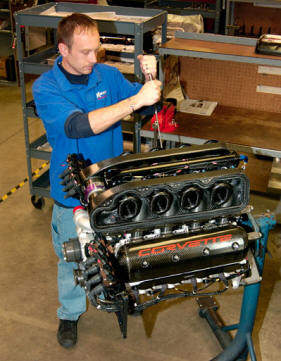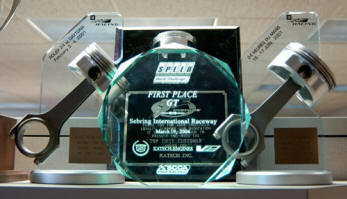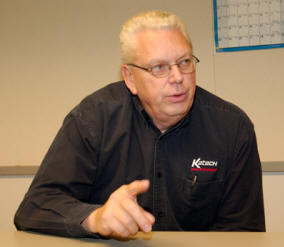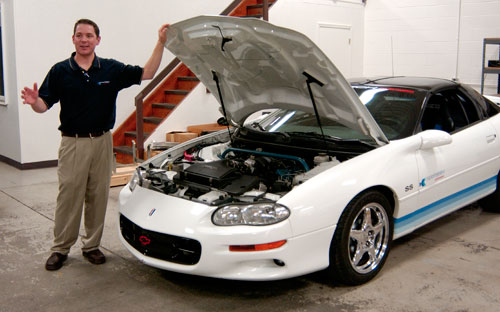Building the Tom Henry RS
Side Bar:
Pt 2: Heads and Valvetrain
Kaytech
|
We'll bet a fair number of Camaro enthusiasts
have never heard of Katech, Inc. No surprise,
considering the under-the-radar nature of the
Clinton Township, Michigan engineering firm
which has been the sole engine supplier for
Corvette Racing since the program began a decade
ago. Not only has Katech developed and
maintained the C5-R and the C6.R race engines
for the last ten years; it assisted GM
Powertrain on development and validation of the
'06/'07 Z06's 505hp LS7.
The "Ka" in Katech is Fritz Kayl, who, along
with Warren Frieze, founded the company in 1977
with Chevrolet as their first customer. Their
mission: apply their knowledge of internal
combustion engine engineering and physics along
with scientific method and business management
principles to race engine building. |
|
 |
|
Kevin Pranger, Katech's
Program Manager for the Corvette
Racing's engine program works on an
LS7.R race engine that powered a C6.R at
LeMans this year.
Image: CHpg Staff. |
|
There's emotion and common sense in Katech's approach,
too. "I became a Chevy guy in my teens," Kayl
told The Camaro Homepage, "and I never
wavered–a lot of loyalty there. I'm very proud of that.
|
 |
|
Katech's reception area
is partailly filled with a display of
the scores of championship and race win
trophies and awards, like this one from
the Daytona 24-hr race in 2004. Image:
CHpg Staff |
|
"In the race engine business, it's not so much
getting things right; it's how many things you
do wrong which makes you a winner or a loser. At
Katech, we try not to 'out-trick' ourselves. We
focus attention on theory and practice rather
than trying to find the latest hot trick. We do
everything in our power to win races."
|
Has
Kayl's approach worked?
Look
at the record. Katech-built, Chevrolet V8 and V6es have
won hundreds of races, including the 24 Hours of Le Mans
(5-times), 12 hrs. of Sebring (4-times) and Daytona 24
hrs. (twice). Those wins earned scores of championships:
American Le Mans Series (6-times with C5-Rs/C6.Rs); ASA
(4-times); NASCAR Busch Grand National (3-times); IMSA
GTS (twice), IRL and that's only part of them. At
www.katechengines.com, a list of racing successes uses
up an entire page and that list may get longer if
Corvette wins the ALMS again this year and the Cadillac
CTS-V wins the SCCA World Challenge. Both those cars are
leading their series' manufacturer standings at this
writing.
Of
interest to Camaro enthusiasts is that Katech engines
won the SCCA Trans-Am Championship five times. Four of
those series wins were by Camaros with Katech power and
all four were "dual-championships" where the race team
won both the Driver's Championship and the
Manufacturer's Championship. Yeah, Katech motors make
tons of power, but what sets consistent win records like
that is race winning power along with bullet-proof
reliability and durability.
|
Recently, we toured Katech's four-building
complex and what we saw drove home the resource
thing Fritz Kayl spoke about. One building
houses six engine test cells, each devoted to a
specific type of research. There is one cell for
valve train testing and analysis. In it, a 30-hp
electric motor spins rotating parts of test
engines while real-time observation and
measurement of valve action is done using a
laser. Another cell is devoted friction and
other parasitic loss testing. It has a 300-hp
electric motor which can drive an entire engine
while test equipment measures losses. A third is
used for fuel system development and three other
cells contain engine dynamometers. |
|
 |
|
Katech's Fritz Kayl,
during our interview with him in the
Fall of 2006.
Image: CHpg Staff. |
|
Another building houses CNC machining centers where
cylinder heads and blocks are processed. The "meat and
potatoes" of Katech is the engine assembly department.
It's a large, well-lit area divided into 14 cubicles
where each assembler puts together an engine in a
careful, precise manner. At Katech, the same people, who
one week, build an LS7.R race engine for the C6.R, the
next week, do an engine for a customer's 4th Gen. Camaro
with similar attention to detail.
While we'd seen "industrial metrology" (the application
of measurement science to manufacturing) rooms in big
manufacturing plants, we'd never seen one at engine
shops we'd visited before, but Katech has one. Another
room is filled with computers at which sit engineers
working with CAD programs.
"One strength of our racing programs and core race
engine business,"
Caleb Newman, Katech's Director of Aftermarket
Operations told us, "has given us are resources we
use for development of our street performance products.
It's not cost effective for a company which is only
marketing aftermarket performance products to do the
type of race engine development we do at Katech. The
only reason we're able to do it and be competitive in
the performance aftermarket is we already have those
resources built-up over the last 30 years.
"The greatest asset those resources have given us is
reliability. We may not make much more power other
performance engine vendors, but we can match that power
with a far more reliable package...one we're much more
confident putting on the street.
"What we do for the aftermarket is the highest level of
processes, diligence, testing, validation and quality
that money can buy. We feel no one else can offer this
because they lack our years and years of racing
experience. Our guys who are building the LeMans winning
engines are also building our street performance
engines. You're not going to find nearly 400 years of
professional race engine building experience anywhere
else. No other company is doing that using the same
tools, the same processes, the same machinery which we
do.
"It's not the technology or the parts which makes us
successful. It's the lessons we learn from the processes
that we use...the processes, the people and the
experience we apply to the street performance engines
and you can't do that without the kind of racing
experience we have."
|
 |
Katech's Caleb Newman
explains the engine in Katech's "Street
Attack LS7" development Camaro. The engine
in this car makes about 640hp. The car has
gone 10.86 and, while not "streetable" in
the broad sense of the term, it can be
driven on the street. Katech has other
Street Attack engine packages which make a
little less power but are very easy to drive
on the street. Image:
CHpg Staff. |
Katech's track-proven Chevrolet racing heritage is
available to the owner of any V8 powered fourth gen
Camaro wanting to personalize his or her car with
aftermarket performance enhancements for the road or
track such as: complete V8 engines, CNC-ported heads,
camshafts, titanium connecting rods, ported throttle
bodies and racing drive belt tensioners. Some of
Katech's V8 performance parts, such as valve springs and
retainers, also fit 3800 V6es. Once the 2010 Camaro hits
the streets, you can bet the engine experts at Katech
will be doing high-performance street and racing
development of the car's LS3 V8.
"To work with Corvette,"
Fritz Kayl told us at the end of our visit, "to go to
Le Mans and win five out of the last six tries with an
American race car is a dream come true. I get very
emotional about it. I'm proud of the accomplishments of
this company."
|